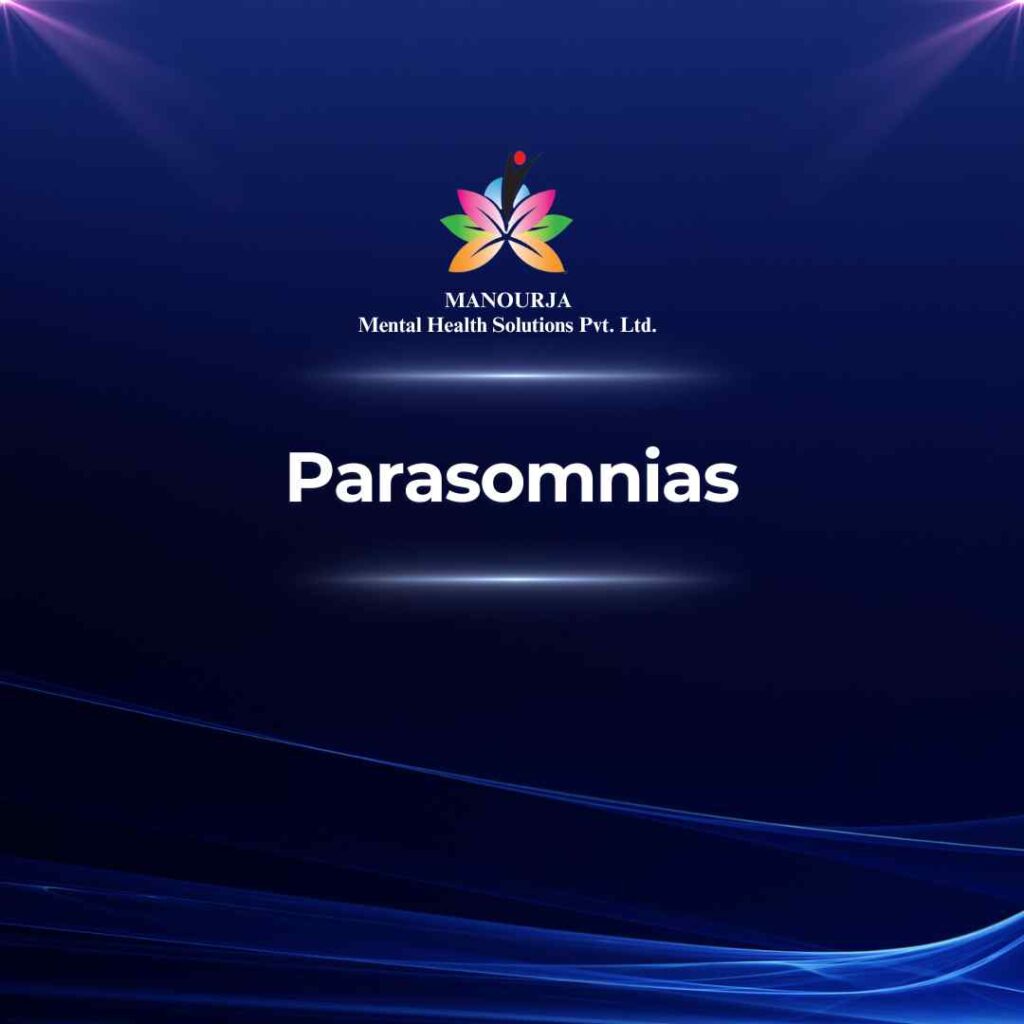Parasomnias

Parasomnias involve abnormal movements, behaviors, emotions, perceptions, and dreams that occur while falling asleep, sleeping, between sleep stages, or during arousal from sleep. Parasomnias can disrupt sleep, although the person experiencing them may not always be aware of what has happened.
Symptoms of Parasomnias
- Abnormal Movements or Behaviors: This can include walking, talking, or eating while asleep.
- Emotional Experiences: Intense emotions such as fear or panic may accompany events.
- Perceptions: Hallucinations may occur, either visual or auditory, during episodes.
- Dreams: Vivid dreams that can be unsettling or disturbing often accompany parasomnias such as REM sleep behavior disorder.
- Confusion Upon Waking: Individuals often feel disoriented or confused upon waking from an episode.
Forms of Parasomnias
NREM-Related Parasomnias: These occur during the non-rapid eye movement (NREM) stages of sleep and include disorders such as:
- Confusional Arousals: Where a person might seem awake but is confused and disoriented.
- Sleepwalking (Somnambulism): Engaging in activities that one would normally do while awake, such as walking around the house, but while asleep.
- Sleep Terrors (Night Terrors): Experiencing extreme fear and screaming while asleep without waking fully.
REM-Related Parasomnias: These occur during rapid eye movement (REM) sleep and include:
- REM Sleep Behavior Disorder (RBD): Acting out dreams as if they were real, including talking, yelling, punching, kicking, sitting up in bed, etc.
- Recurrent Isolated Sleep Paralysis: The temporary inability to move or speak while falling asleep or upon waking.
- Nightmare Disorder: Frequent, extremely vivid and disturbing dreams that disrupt sleep, cause distress, or impair functioning during wakefulness.
Treatment of Parasomnias
- Safety Measures: Ensuring a safe sleep environment is crucial, especially for those prone to activities like sleepwalking. This may involve securing windows and doors, removing sharp objects, and placing mattresses on the floor.
- Medications: Depending on the type of parasomnia and its severity, medications may be prescribed. For example, benzodiazepines are sometimes used to treat sleep terrors and sleepwalking. Clonazepam is often used for REM sleep behavior disorder.
- Behavioral Interventions: Good sleep hygiene practices, such as maintaining a regular sleep schedule, creating a comfortable sleep environment, and managing stress, are often recommended. Counseling or therapy may help manage stress, anxiety, or other underlying issues.
- Cognitive Behavioral Therapy (CBT): For nightmare disorder, CBT can helpmodify the nightmares and reduce their occurrence.
- Scheduled Awakenings: For night terrors and sleepwalking, briefly waking the person approximately 15-30 minutes before the expected time of an event can prevent occurrences.
- Treatment of Underlying Conditions: Addressing any underlying conditions or medications that may contribute to parasomnia is essential. This includes managing disorders like sleep apnea, mood disorders, or adjusting medications that might exacerbate parasomnia symptoms.
Because parasomnias can vary widely in terms of their manifestation and impact, treatment often needs to be personalized. Consulting with a sleep specialist is important to obtain a correct diagnosis and appropriate treatment plan.
At MANOURJA, we believe in the transformative power of counseling. Our experienced therapists offer a safe and supportive space where you can explore your thoughts, emotions, and challenges. Through personalized counselling sessions, we’ll work together to develop coping strategies, build resilience, and achieve lasting positive change. Discover the path to a healthier, happier you with MANOURJA counselling services.
MANOURJA Rehabilitation Services
At MANOURJA, we’re dedicated to helping you in rebuild your life, after difficult times. Our rehabilitation services focus on understanding what you need to move forward, whether you’re recovering from addiction, trauma, or any psychological – social challenges. We create personalized plans, that are all about helping you, regain your strength and find hope again. With a caring team by your side, you’ll have the support to make real progress and take steps toward a brighter, healthier future.
